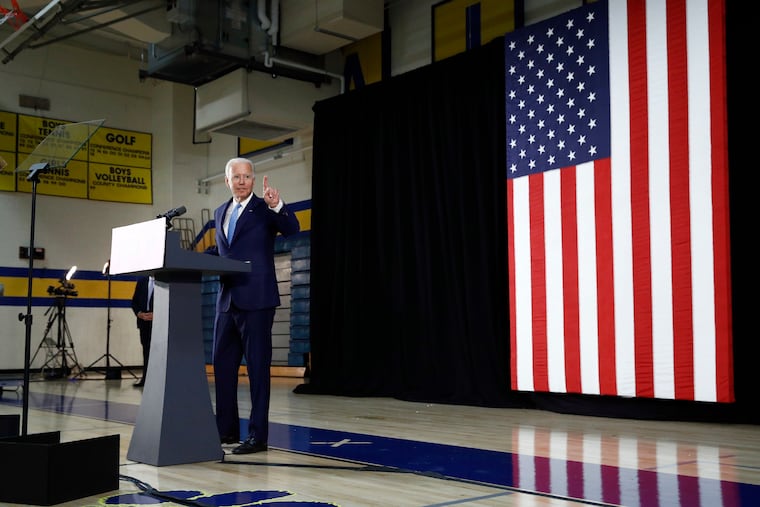Biden opens the door to expand school choice | Opinion
Joe Biden appears to have proposed—without quite realizing it—the largest expansion of federal school choice in American history.

Facing the prospect of another semester, or even year, of the failure of public education to adapt to COVID-19, American parents are scrambling to form educational “pods” in collaboration with other families. Ten families chipping in $10,000 apiece, for example, could hire an excellent teacher to provide their children with personalized learning in an intimate, friendly, and safe environment.
Conservatives love the idea, seeing it as a Tocquevillian response to a social emergency that could lay the groundwork for a more diverse and pluralistic educational system. Some progressives see the same possibility but interpret it differently, lamenting the rise of pods as another instantiation of “white supremacy.” One doesn’t have to endorse progressives’ overheated race rhetoric to recognize a legitimate concern about pods: Lower-income households will have a harder time amassing the resources necessary to hire quality teachers, raising the prospect of an expanding achievement gap. That concern could be largely ameliorated, however, with a tax credit refunding their expenses.
» READ MORE: Joe Biden used a visit to West Philly to introduce his plan to restart the national economy
Into this evolving landscape steps presumptive Democratic presidential nominee Joe Biden, who appears to have proposed — without quite realizing it — the largest expansion of federal school choice in American history. Last month, the Biden campaign promised to extend a refundable tax credit of up to $8,000 to cover child-care expenses for kids 13 and younger; families making up to $125,000 annually would be eligible.
While Biden almost certainly does not intend for his proposal to underwrite a mass exodus from traditional public schools, the plan could assist parents who want to join with other families to find better educational alternatives. Given the blurry line between schooling and child care — as illustrated by school districts that remain officially “closed,” even as schools charge parents for “child care” — it’s hard to see how regulators could maintain a credible distinction.
Already, child-care providers in cities such as Charlotte, N.C., are coordinating and supplying teachers for “pods,” telling parents that they accept child-care tax credits. Biden’s tax credits could help expand this model dramatically.
» READ MORE: Trump’s warning that Biden will ‘destroy’ the suburbs is falling flat outside Philly
His proposal might also prove a boon to established private schools. With some restructuring, private schools could deflate their tuition prices, raise their cost of afterschool child care, and improve their financial bottom line while alleviating the financial burden on parents. In the wake of the Supreme Court’s recent Espinoza decision, the federal government would have a hard time excluding religious schools from serving as day-care providers.
In terms of their potential reach, Biden’s tax credits would exceed the scope of the Trump administration’s proposed Educational Freedom Scholarships. EFS would provide a tax credit for third-party donations to scholarship-granting organizations only in states with approved programs, and in practice would largely benefit families below or near the poverty line. Biden’s proposal would directly benefit families making up to $125,000 in every state.
President Donald Trump has said that “if schools do not reopen, the funding should go to parents to send their child to public, private, charter, religious, or home school of their choice.” As critics have noted, Washington has no authority to disburse local and state taxpayer dollars if schools stay closed. But Congress has the authority to provide parents with a tax credit for child care — or any other educational expense.
» READ MORE: Who should pay for private and religious schools? | Editorial
On almost any issue, it’s a sound axiom that Republicans should never try to get into a bidding war with Democrats. But here, Trump and congressional Republicans should consider making an exception to that rule. As Congress debates the next round of financial stimulus, a conservative legislator should introduce a “pod tax credit” to help parents educate their kids during the pandemic. For parents scrambling to organize an affordable educational alternative, the promise of a substantial tax credit to defray costs would prove a political winner.
Regardless of whether such a proposal passes, the debate would help normalize the principle that parents should be given the resources to direct their children’s education. Joe Biden might not realize that he has put school vouchers back on the campaign agenda — but let’s hope that the Trump campaign notices and reacts accordingly. It should expand on Biden’s proposal and sell it for what it truly is: an expansion of educational choice. If Trump joins Biden in that discussion, then no matter who prevails this November, parents and kids might walk away as the real winners.
Max Eden is a senior fellow at the Manhattan Institute: @MaxEden99. A version of this piece first appeared in City Journal.